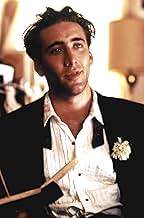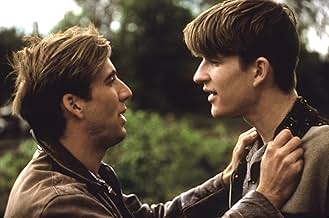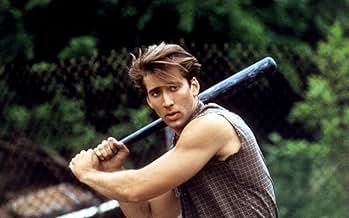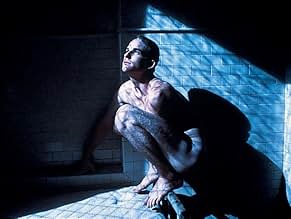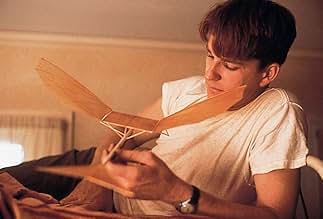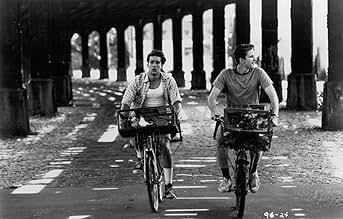VALUTAZIONE IMDb
7,2/10
25.598
LA TUA VALUTAZIONE
Dopo che due amici tornano a casa dalla guerra del Vietnam, uno diventa mentalmente instabile e ossessionato dal diventare un uccello.Dopo che due amici tornano a casa dalla guerra del Vietnam, uno diventa mentalmente instabile e ossessionato dal diventare un uccello.Dopo che due amici tornano a casa dalla guerra del Vietnam, uno diventa mentalmente instabile e ossessionato dal diventare un uccello.
- Premi
- 3 vittorie e 1 candidatura in totale
Pat Ryan
- Joe Sagessa
- (as Robert L. Ryan)
Maud Winchester
- Doris Robinson
- (as Maude Winchester)
Trama
Lo sapevi?
- QuizNicolas Cage had two teeth removed (without anesthetic) for this role.
- BlooperAl calls Birdy "Al" (11:08)
- Curiosità sui creditiAnimals: Perta ... Bird No. 9 Perta's Stunts ... Queepers Alfonso ... AS HIMSELF Cat ... Hobbie Dogs ... Sneaky, Willey, Ace, Prince, Tiger, Bo, Rudah, Chiggar, Tyko, Kelly, Red, Fantasy, Scooter. Seagull ... Jonathan Snake ... Monty Jungle Bird ... Horatio Pigeons ... No's. 1 to 84
Recensione in evidenza
(I was flipping through the channels one quiet evening at home when I stumbled across this picture, "Birdy.")
To some, the character Birdy (Matthew Modine) has an unnatural and (quite) unhealthy obsession with birds. Well, he spends most of his time with birds, has dreams of flying away from his real-world troubles, and his only friend is a neighborhood tough named Al (Nicolas Cage). So because of his obsession with birds, Birdy has to be crazy, right? So is Al even crazier for befriending him well, isn't he?
It is these questions and many more that make up the central theme of Alan Parker's superb 1984 drama "Birdy" (adapted from William Wharton's novel), a film about two crazy guys whose friendship is ultimately tested by each other's mental sicknesses. Both of their lives take drastic turns before and after they have done tours in Vietnam, and ultimately wind up in opposite ends of the psyche ward of a state mental hospital, with Al, who's been left virtually unrecognizable by his facial bandages and Birdy, who's stuck in a catatonic state as a result of an accident out on the killing fields.
It is also the feelings of isolation between the two that brings them together, as flashbacks during their stay help to emphasize their emotions. Birdy, feeling like he is the only one that understands his bird "dream," may in actuality be the only "sane" character in the whole film. Al, who is injured from a shell explosion, questions who he is because he's not even sure who it really is underneath the bandages on his face. And it is liberation, whether it be physical or mental, that is expressed greatly by the film's ending, and Birdy's eventual coming to grips with his own current predicament.
Director Parker has always made it a point of capturing human suffering on celluloid, and this has been the main subject in a number of his films, including "Midnight Express" (1978) and "Angel Heart" (1987). Here, his subject matter is fairly lighter than those films, since the audience is spared the really intense mental anguish that accompanied "Express" and the graphic carnage of "Angel."
There's a kind of deep spiritual undercurrent flowing through "Birdy," which is most apparent by the lead character's fascination with his quarry birds. To him, birds represent freedom, a kind of freedom that can only be obtained by literally taking to the skies, and soaring high above all his problems (fans of Terry Gilliam's political satire "Brazil" should take notice here). This of course leads to the film's profound ending on the mental hospital's rooftop, where Al and Birdy must make a desperate choice choose freedom, or choose confinement of the body, or of the psyche.
I won't reveal any more than those close details but you'll have to see what happens for yourself. It really caught me off guard and in a lesser movie might seem tacky, but the way Parker and the actors handle just makes the on-screen action that much more moving. But you can be sure of this: Birdy flies. And "Birdy" does fly into underrated classic movie status because of its performers and director Alan Parker's direction.
10/10
To some, the character Birdy (Matthew Modine) has an unnatural and (quite) unhealthy obsession with birds. Well, he spends most of his time with birds, has dreams of flying away from his real-world troubles, and his only friend is a neighborhood tough named Al (Nicolas Cage). So because of his obsession with birds, Birdy has to be crazy, right? So is Al even crazier for befriending him well, isn't he?
It is these questions and many more that make up the central theme of Alan Parker's superb 1984 drama "Birdy" (adapted from William Wharton's novel), a film about two crazy guys whose friendship is ultimately tested by each other's mental sicknesses. Both of their lives take drastic turns before and after they have done tours in Vietnam, and ultimately wind up in opposite ends of the psyche ward of a state mental hospital, with Al, who's been left virtually unrecognizable by his facial bandages and Birdy, who's stuck in a catatonic state as a result of an accident out on the killing fields.
It is also the feelings of isolation between the two that brings them together, as flashbacks during their stay help to emphasize their emotions. Birdy, feeling like he is the only one that understands his bird "dream," may in actuality be the only "sane" character in the whole film. Al, who is injured from a shell explosion, questions who he is because he's not even sure who it really is underneath the bandages on his face. And it is liberation, whether it be physical or mental, that is expressed greatly by the film's ending, and Birdy's eventual coming to grips with his own current predicament.
Director Parker has always made it a point of capturing human suffering on celluloid, and this has been the main subject in a number of his films, including "Midnight Express" (1978) and "Angel Heart" (1987). Here, his subject matter is fairly lighter than those films, since the audience is spared the really intense mental anguish that accompanied "Express" and the graphic carnage of "Angel."
There's a kind of deep spiritual undercurrent flowing through "Birdy," which is most apparent by the lead character's fascination with his quarry birds. To him, birds represent freedom, a kind of freedom that can only be obtained by literally taking to the skies, and soaring high above all his problems (fans of Terry Gilliam's political satire "Brazil" should take notice here). This of course leads to the film's profound ending on the mental hospital's rooftop, where Al and Birdy must make a desperate choice choose freedom, or choose confinement of the body, or of the psyche.
I won't reveal any more than those close details but you'll have to see what happens for yourself. It really caught me off guard and in a lesser movie might seem tacky, but the way Parker and the actors handle just makes the on-screen action that much more moving. But you can be sure of this: Birdy flies. And "Birdy" does fly into underrated classic movie status because of its performers and director Alan Parker's direction.
10/10
I più visti
Accedi per valutare e creare un elenco di titoli salvati per ottenere consigli personalizzati
- How long is Birdy?Powered by Alexa
Dettagli
- Data di uscita
- Paese di origine
- Sito ufficiale
- Lingua
- Celebre anche come
- Birdy
- Luoghi delle riprese
- Wildwood, New Jersey, Stati Uniti(Atlantic City - Fairground)
- Aziende produttrici
- Vedi altri crediti dell’azienda su IMDbPro
Botteghino
- Budget
- 12.000.000 USD (previsto)
- Lordo Stati Uniti e Canada
- 1.455.045 USD
- Fine settimana di apertura Stati Uniti e Canada
- 13.720 USD
- 25 dic 1984
- Lordo in tutto il mondo
- 1.455.096 USD
- Tempo di esecuzione2 ore
- Colore
- Mix di suoni
- Proporzioni
- 1.85 : 1
Contribuisci a questa pagina
Suggerisci una modifica o aggiungi i contenuti mancanti

Divario superiore
By what name was Birdy - Le ali della libertà (1984) officially released in India in English?
Rispondi

